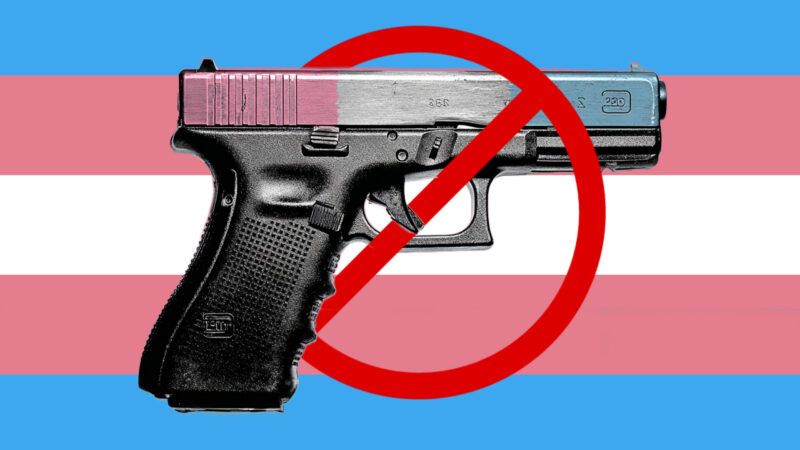The Trump Administration's Half-Baked Plan To Disarm Transgender People Is Legally Bankrupt
Such a gun ban is not authorized by statute or allowed by the Second Amendment.

When Justice Department officials anonymously floated the idea of prohibiting gun possession by transgender people last week, they may have hoped to score points with President Donald Trump's base or get a rise out of "woke" Democrats. Instead, they elicited howls of outrage from every major gun rights group.
It is not hard to see why. This half-baked proposal, which has no obvious statutory basis, is flagrantly inconsistent with "the right of the people" to "keep and bear arms"—a right that Trump claims he is keen to protect.
The immediate impetus for internal discussions of disarming transgender Americans was the August 27 shooting that killed two children and injured 21 other people at the Annunciation Catholic Church in Minneapolis. Police identified the perpetrator, who killed herself after attacking the worshipers, as a 23-year-old transgender woman.
CNN reported that "Justice Department leadership is seriously considering whether it can use its rulemaking authority" to "declare that people who are transgender are mentally ill and can lose their Second Amendment rights to possess firearms." It quoted an unnamed Justice Department official who explained that the goal would be to "ensure that mentally ill individuals suffering from gender dysphoria are unable to obtain firearms while they are unstable and unwell."
The implication was that Congress had given the Justice Department broad authority to strip "mentally ill individuals" of their Second Amendment rights. The impact of such a power could be sweeping, since survey data indicate that half of all Americans will qualify for a psychiatric diagnosis at some point in their lives, while a quarter of them do in any given year.
Under current law, however, someone described as "mentally ill" loses his gun rights only if he has been "adjudicated as a mental defective" or "committed to a mental institution," both of which require a court order based on an individualized assessment. That rule is unreasonably broad, since it applies to anyone who has ever been subjected to involuntary psychiatric treatment, no matter how long ago that happened, whether or not he was ever deemed a threat to others, and regardless of his current psychological state.
Still, even that provision is not broad enough to justify a policy of disarming people based solely on a psychiatric label. "Red flag" laws, which authorize court orders that suspend people's gun rights, also require more than that: a judicial determination that someone poses a threat to himself or others.
The latter process is plagued by due process problems, which explains why it raises the hackles of Second Amendment advocates. So it is not surprising that the National Rifle Association took a dim view of the Justice Department discussions, saying it "does not" and "will not" support "sweeping gun bans that arbitrarily strip law-abiding citizens of their Second Amendment rights without due process."
Under "federal statutes and binding Supreme Court precedent," the Firearms Policy Coalition warned, "the government cannot impose a categorical ban on an entire class of peaceable people." The Justice Department's trial balloon elicited similar objections from Gun Owners of America, the Second Amendment Foundation, the National Association for Gun Rights, and the Citizens Committee for the Right to Keep and Bear Arms.
Even if Congress approved a ban like the one the Justice Department is contemplating, it is hard to see how it would be "consistent with this Nation's historical tradition of firearm regulation"—the Second Amendment test that the Supreme Court established in 2022. Since then, several federal appeals courts have ruled that categorical statutory bans on gun ownership, whether based on illegal drug use or criminal convictions, may be unconstitutional as applied to specific individuals.
In one of those cases, the U.S. Court of Appeals for the 8th Circuit held that "nothing in our tradition allows disarmament simply because [someone] belongs to a category of people" that "Congress has categorically deemed dangerous." Such a ban would be even more constitutionally questionable if it were imposed by bureaucratic fiat.
© Copyright 2025 by Creators Syndicate Inc.
